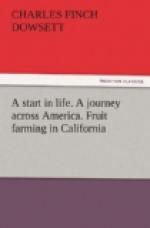As we proceeded we came upon the succession of Placer gold diggings, known as the hydraulic mines, which were then for the most part abandoned, and these brought to my remembrance many similar spots I had seen in Australia. The debris of the mines had stopped up, or diverted, or otherwise interfered with the Sacramento River, the Bear River, and other rivers, to the great detriment of agriculture, horticulture, stock rearing, etc., whereupon the State Legislature of California passed an Act to prohibit all interference with the water, for without water the miners could not wash their dirt, and so had to abandon the diggings. All around this part, ravine followed ravine, with beautiful vistas between, affording a continuous luxury of scenic gratification. Presently we reached what is called by many the grandest scenery on the American Continent, known as Cape Horn; it is where the train winds round a mountain side, on a narrow ledge, and at such a height, that to hold one’s hand out of the window would be to hold it over a sheer precipice of 2,500 feet. The train runs along the ledge or narrow roadway cut in the face of the mountain rock, and all around is presented a spectacle of the majesty of Nature, which only such a range of mountains as the Sierra Nevada could produce.
About 14 miles from Truckee, we reach a station called “Summit,” which lies at an elevation of 7,017 feet, and is the highest point on the Sierra Nevada Mountains reached by railroads, but the granite peaks rise up to an altitude of over 10,000 feet. Grizzly bears, and other wild creatures, find their homes in the recesses of these fastnesses. On leaving these mountains we make a rapid descent, and in an hour feel that we are in another country. At Colfax I bought fruit; at Arlington the temperature was like summer. At Rockling Station I saw some very fine orange trees, full of splendid fruit. Now we have entered the fertile plains of North California, and run through cultivated lands, till we reach Sacramento, the capital of the State. It is a great change: from desert, alkaline plains, miles of snow sheds, snow-covered mountains, a semi-civilization, and a freezing atmosphere, we find ourselves in a warm, genial climate, cultivated farms, vineyards, gardens, and orchards of nectarines, pears, apples, and the rest.
Arriving at Oakland, we crossed the Bay in the great ferry-ship, or floating wharf, “Piedmont.” The weather was charming—the bay dotted about with islands and surrounded by hills. The temperature was the more enjoyable from the fact that only a few hours before we were surrounded by deep snow.




